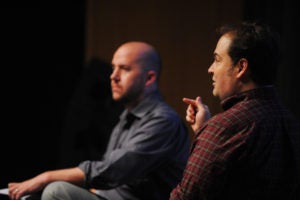May 28, 2013 | Engagement, Keynote, Social Media
Andy Carvin on ‘pushing the button anyways’

NPR’s social media strategist, Andy Carvin, solemnly took the ISOJ podium on Friday, reminiscing his fondest memories of cheering on one runner after another every April.
Just days after the Boston Marathon bombing, Carvin spoke from the heart as he pointed out that both the tragedies of Newtown and Boston have something in common “aside from the horror and needless loss,” and that’s the spreading of misinformation.
As Carvin said in his keynote, it’s rare for a breaking news story to be told from start to finish without someone making a mistake. All journalists are capable of making mistakes and understanding how they happen, but how do we combat mistakes in our increasingly fast-paced society?
Carvin said that in broadcast journalism, dead air is unacceptable. Reporters have to fill airtime, which creates a scenario where even the best journalists make mistakes.
However, according to Carvin, online news isn’t immune from this either.
“How many of us have struggled to keep our live blogs fresh?” he asked. “Social media has made it to where we feel pressure to keep the public as updated as possible. We make the same mistakes.”
There are many times when journalists pause to look at their tweets and wonder what will happen if what they are sending out is wrong. Yet, as Carvin pointed out, “How many of us hit the button anyway?”
Today, most people have a device in their pockets, and to some extent, that’s a positive thing. During the marathon bombing investigation, people were sending in their videos and photos and even conducting their own investigations – but there’s a major caveat that comes with the advantages.
“We are no longer the media in the literal sense of the word,” Carvin said.
Rumors circulate and misinformation spreads. Reddit, for example, went astray in their thread proclaiming, “Reddit gets it right,” when they wrongly accused two innocent men of being suspects in the Boston Marathon bombing.
In his talk, Carvin said that he sees this as a problem of journalists missing the core goal of journalism. There’s a difference, he said, in informing the public and creating a more informed public.
“We should actively address rumors circulating online,” Carvin said. “We should ask the public to challenge them – to scrutinize them. Address readers directly when they spread misinformation.”
Another problem he mentioned is the audience’s habit of parodying certain journalistic terms such as “breaking,” “confirmed” or “reports.”
“We need to stop putting ‘breaking’ and ‘confirmed’ in front of all of our tweets, because it’s pointless – it doesn’t help,” he said.
Part of educating the audience, Carvin added, is engaging with them. If they claimed you confirmed something, but you didn’t, publicly point it out to them.
Another idea Carvin proposed is having someone in the newsroom tell the audience what it is you’re reporting on and how you’re going about getting the story. Additionally, journalists should live in a constant state of transparency by letting readers know when they aren’t completely sure if their information is correct.
In other words, Carvin said, “We should challenge the public to understand what it means to be producers as well as consumers of information.” This way, we can prevent some of the rampant spread of misinformation that occurred in incidents such as Newtown and the Boston marathon bombings.

